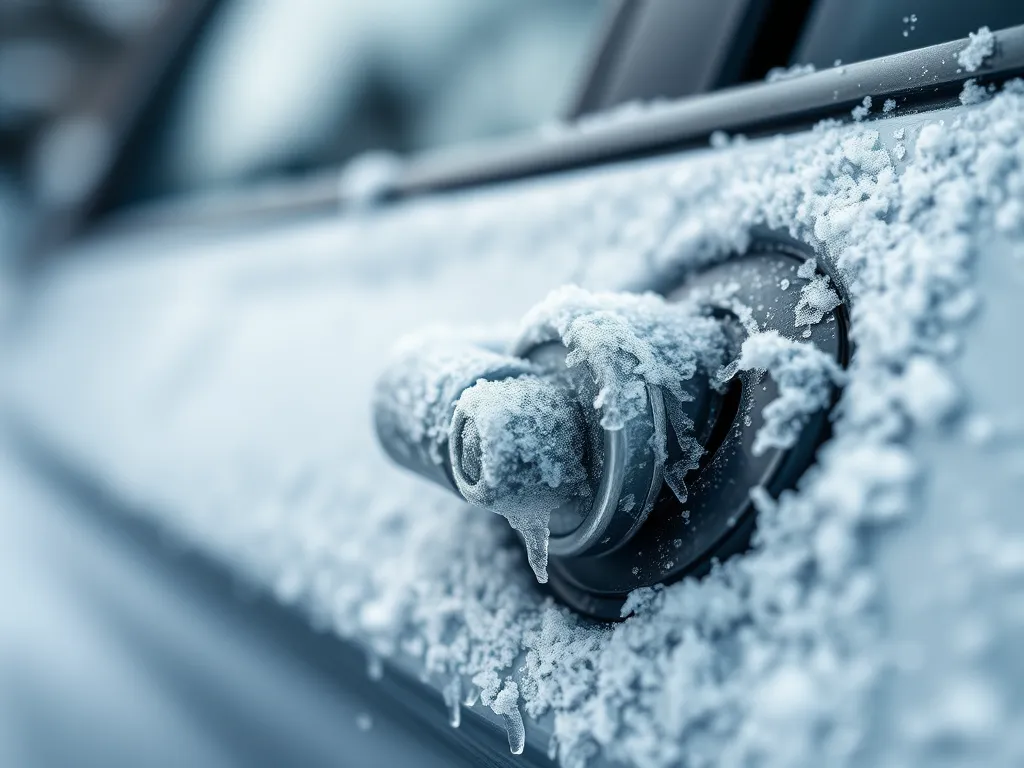Essential Tips: What to Do If Your Car Door Lock is Frozen

Dealing with Frozen Car Door Locks
Dealing with Frozen Car Door Locks can be a frustrating experience, especially during the cold winter months when temperatures drop significantly. The moisture from the air can enter the lock mechanism, freeze, and prevent the key from turning. This issue can leave you stranded outside your vehicle, trying to find solutions to gain entry. Understanding how to effectively handle this problem is essential.
When winter temperatures drop, frozen car door locks become a common issue for many drivers. Not only can ice block the keyhole, but it can also freeze internal components, making it nearly impossible to unlock your vehicle. To avoid being stranded, there are several methods to safely thaw a frozen lock, such as using de-icer sprays or gently heating the key. In case the problem persists, consider seeking professional assistance from a local locksmith. Gold Coast’s premier auto locksmith offers a car door lock service with 24/7 mobile key replacement, ensuring you're never left out in the cold.
To avoid the hassles of dealing with frozen car door locks, it’s important to proactively prepare your vehicle for winter. By maintaining your car's locks, using specific products, and following proper care methods, you can minimize the chances of experiencing this trouble. A combination of immediate and preventative measures can help ensure that you stay on the go even in the coldest of conditions.
When winter hits hard, dealing with frozen car components can be a frustrating experience. One of the most common problems is a frozen car door, which can leave you stranded at the worst possible times. Fortunately, there are various ways to address this issue, from applying de-icer sprays to using heated tools specifically designed to free the lock. Taking preventive measures like lubricating your locks before freezing temperatures arrive can also help you avoid this problem altogether. For more solutions and expert advice, be sure to check out resources from reputable locksmiths.
In addition to being proactive, it’s also crucial to know what to do in emergency situations. Even the most prepared individuals may find themselves facing a frozen lock unexpectedly. Knowing how to handle these scenarios promptly and safely can prevent unnecessary damage to your vehicle and save valuable time. The right knowledge about dealing with frozen car door locks can empower you to take control when winter strikes.
Once you've dealt with a frozen lock, taking steps to care for that lock afterwards is equally important. Ensuring that the lock operates smoothly can extend its life and maintain its functionality over time. Post-unfreeze care includes regular maintenance habits that keep your locks in prime condition and improve their resistance to freezing in the future.
In conclusion, Dealing with Frozen Car Door Locks involves understanding the causes, knowing immediate solutions, taking preventative measures, and providing post-unfreeze care. With this knowledge at hand, you can navigate winter with confidence and ensure that your vehicle remains accessible when you need it most.
Immediate Solutions for Frozen Locks
One of the quickest ways to address a frozen lock is to pour warm water over it. This will help thaw the ice inside the lock, allowing you to use your key. However, be cautious not to use boiling water, as extreme temperatures can damage the lock mechanism.
Another effective method is to apply a hairdryer over the lock. Make sure to hold the hairdryer at a safe distance to prevent overheating the lock. The warm air will gradually melt the ice, allowing for smoother operation of the lock.
During the colder months, it's common for car door locks to freeze, especially if the vehicle is exposed to freezing temperatures overnight. To prevent this, it's essential to take proactive steps, such as using a silicone-based lubricant on the lock mechanisms. However, if you're already dealing with a frozen door lock, there are several methods you can try, such as using a de-icing spray or warming the key with a lighter before inserting it into the lock. These solutions can help thaw the lock quickly and get you back on the road.
Utilizing hand warmers or heat packs is another great approach. Simply hold the warm pack against the frozen lock for a few minutes. You can also place these warmers inside the car door, which can help thaw the lock from the inside out.
Preventative Measures for Winter Care
Regular maintenance of car locks is a vital aspect of preventing freezing issues. Inspect locks periodically and clean them to remove any debris or moisture that could contribute to freezing.
Using lock de-icer spray on your locks before winter can be a helpful preventative measure. These sprays contain alcohol, which can prevent moisture from freezing and keep your locks functioning smoothly.
Applying silicone spray for lubrication on a regular basis can also work wonders. This not only lubricates the lock but provides a protective barrier against moisture, reducing the chances of freezing.
Emergency Tips When Locked Out
If you find yourself locked out due to a frozen lock, consider breaking into your car safely. Utilize tools specifically designed for this purpose and take care not to damage your vehicle's interior or exterior.
Calling a locksmith service can be a reliable option if you can't resolve the issue on your own. They have the tools and experience necessary to safely unlock your vehicle without causing any damage.
Finally, using a slim jim technique can sometimes work effectively in emergency situations. This requires careful maneuvering of the slim jim to unlock the door mechanism, but must be done with caution not to damage wiring inside the door.
Understanding Why Locks Freeze
Locks freeze primarily due to the impact of moisture that accumulates in various parts of the mechanism. When temperatures drop, this moisture can freeze, creating a blockade that prevents the lock from working properly.
Low temperatures have a significant effect on the entire locking mechanism. Oil lubricants can thicken or solidify, impairing the smooth operation of the lock and contributing to freezing issues.
Common causes of frozen car door locks include excessive rain or snow, humidity, and poor seal integrity in the door rubbers. Any moisture that penetrates these seals can lead to issues once the temperatures drop.
Post-Unfreeze Care for Car Locks
After successfully thawing a frozen lock, testing the lock function is crucial. Make sure that the key turns smoothly and the lock engages properly to avoid future complications.
Applying protective lubricants post-unfreeze can help restore the lock's functionality. This minimizes friction and helps resist future freezing by providing a protective layer against moisture.
Finally, checking for any damage or wear in the lock is essential after it's been frozen. Make sure everything is functioning properly and address any issues before they worsen, ensuring reliable performance throughout the winter months.
